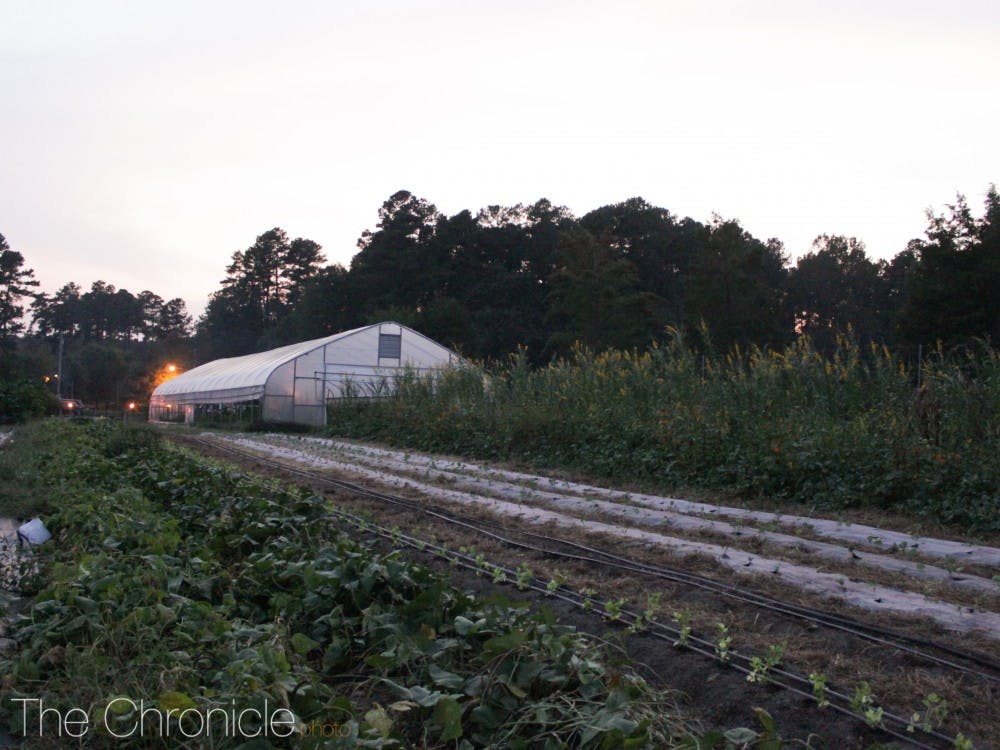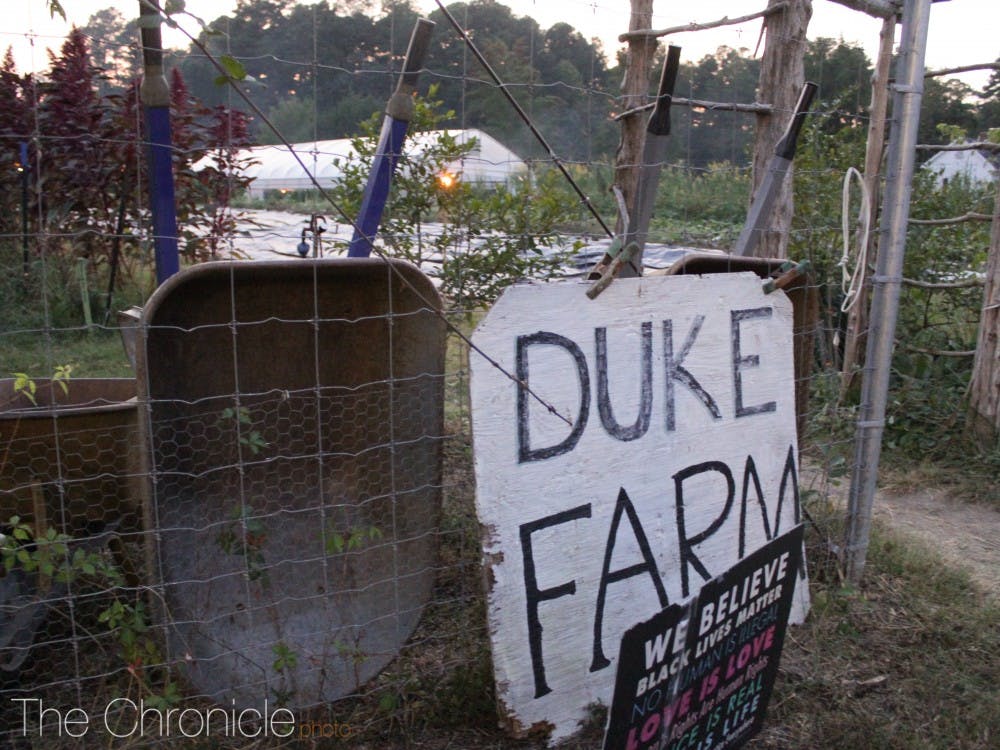Despite blustery winds and a cold drizzle, more than 20 volunteers showed up at the Duke Campus Farm’s community work day on Sunday to help its student crew seed parsley plants, harvest tomatoes and thin beets.
The Duke Campus Farm, which was founded by Duke undergraduates in 2010, is a one-acre property worked by four staff members, 12 student crew members and many more community and student volunteers. The farm provides produce to Duke Dining facilities, and it is the hub of a Community Supported Agriculture program that provides community members with boxes of fresh food.
Throughout the fall semester, the farm holds community work days from 3 p.m. until 5 p.m. on Thursdays and Sundays. Assistant program manager Emily McGinty emphasized that these work days are open to anyone, and no Duke ID or other kind of ID is necessary.
“We are your campus farm. Our time is your time,” McGinty said.

She added that the farm is part of pre-departure programming for many DukeEngage programs, including those that travel to Portland and Rwanda.
For example, when The Chronicle visited the farm on Sunday, students from the DukeEngage guiDE program were volunteering. Before DukeEngage students work with their nonprofit partners, the farm acts as their “testing ground” for different questions that might arise in their programs.
A hub for curricular and co-curricular student opportunities, the farm is the site for various academic experiences such as those through Duke Immerse and Bass Connections, according to the farm’s website.
First-years Vaneesha Patel and Sarah Kelso came to their first work day on Sunday. They said that they learned about the farm through their Introduction to Environmental Sciences and Policy course, which currently offers students extra credit for attending a community work day. Kelso and Patel are both prospective environmental science majors, and both plan on returning to the farm.
Saskia Cornes, assistant professor of the practice at the John Hope Franklin Humanities Institute, said the farm’s commercial production and academic offerings have increased in scope and scale since she was hired as the farm’s program director in 2014.
Cornes helped the farm size increase from half an acre to a full acre, she said, and she has added two additional full-time staff members and ten more student crew members.
The farm’s four full-time staff members work to keep the farm student-led by trying to “solicit, incorporate and uplift students voices in figuring out what kind of programming [they] should run,” Cornes said.
She said that the farm has a “pretty horizontal structure,” and the staff wouldn’t be able to keep it running without volunteers and student crew members, who work eight to 10 hours per week.
Crew member Emily McNamara, a master’s student at the Nicholas School of the Environment, said that the Farm is important to her because she enjoys “being able to get a bit of reprieve from the academic setting and come out here to a more natural space,” as well as meeting the students and community members who show up at the work days.
Cornes has also encouraged the creation of academic connections, through both coursework and research collaborations, to ensure that the farm supports the University’s mission of educating students.
Many groups who work toward improving the food system tend to emphasize changes in individual behavior because “everybody eats,” McGinty elaborated. The Campus Farm, however, tries to go beyond that perspective by focusing on more intellectually rigorous concepts in its course engagement.
Students attend Duke to be “armed as literate leaders in all kinds of systems,” McGinty said, so they should include food systems in that paradigm.
The farm is a place that is “important not only for the nutritious food it grows but also for the cultivation of knowledge and thought on our food systems” junior Kendall Jeffreys, a first-time crew member and communications intern at the farm who participated in the Food Studies DukeImmerse program last year, wrote in an email.
The Farm is one of around 100 such programs at liberal arts campuses around the country, according to Cornes.
Field work isn’t the only focus—the farm currently displays a copy of a mural created as part of a course co-taught by Durham artist Cornelio Campos, McGinty said.
During the course called Farmworkers in North Carolina, Duke students visited the farm and a variety of other sites in Durham to conduct research for the mural. The piece contains symbolism of the histories of Native American, black and Hispanic communities in North Carolina as they relate to agriculture. The original resides at the Rubenstein Arts Center.
Get The Chronicle straight to your inbox
Signup for our weekly newsletter. Cancel at any time.

Anna Zolotor is a Trinity senior and recruitment chair for The Chronicle's 118th volume. She was previously news editor for Volume 117.

